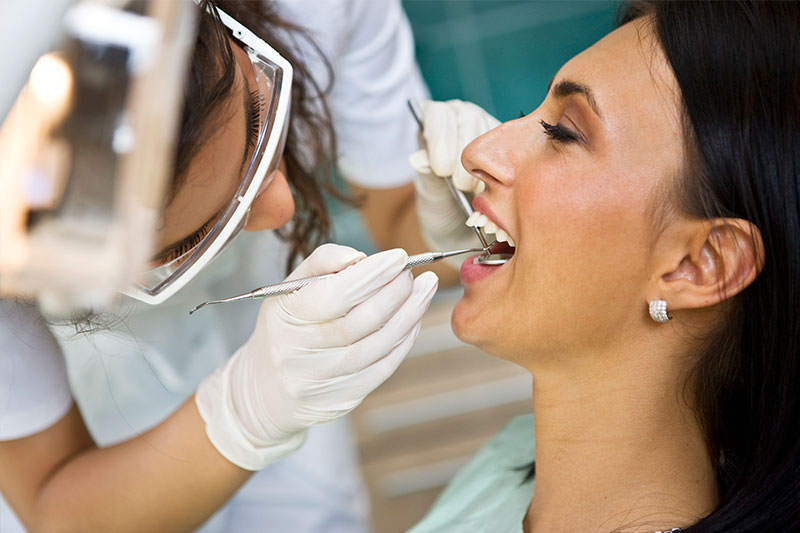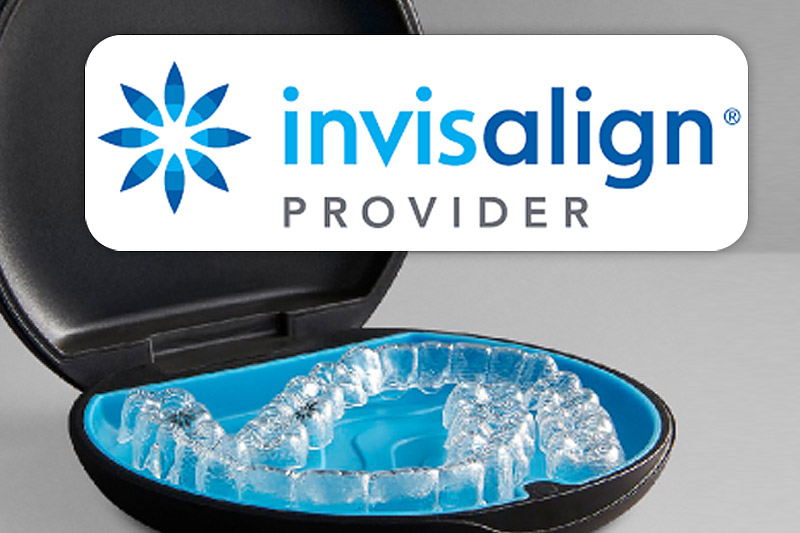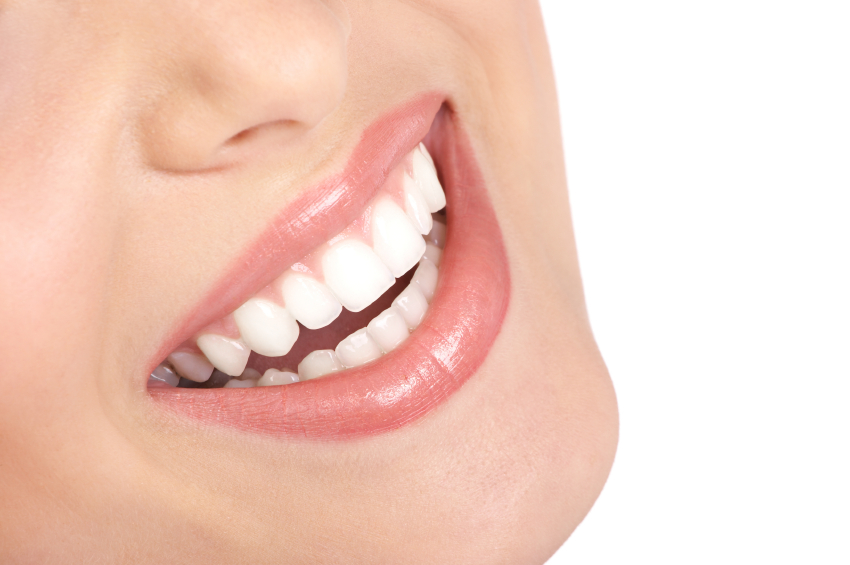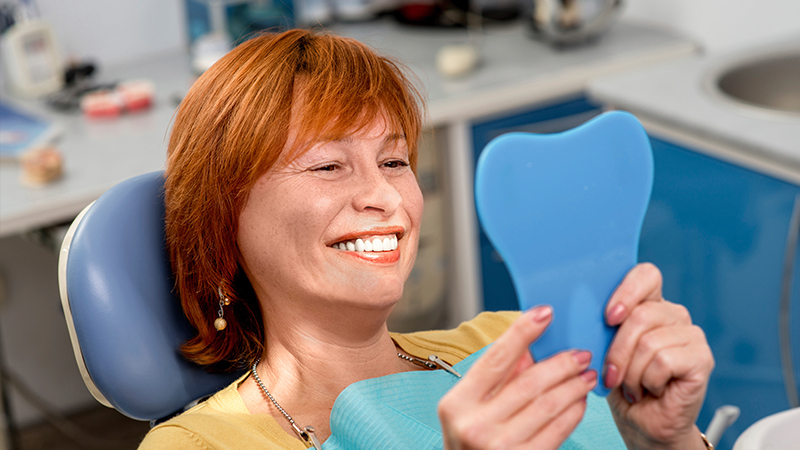Author: admin
Teeth Cleaning & Dental Exams in Watertown MN
Dental cleaning is a simple, painless, and non-invasive preventive dental procedure that seeks to reduce the risk of dental issues such as cavities, gum disease, and bad breath by removing built-up plaque and tartar. Patients often experience some mild vibrations, cooling mist of liquid, and a bit of pressure during scraping, though this doesn’t cause any discomfort. On the contrary, the feeling can be quite satisfying in knowing that you can keep enjoying your healthy teeth and smile for longer.
Ideally, dental cleanings should be performed every six months, but your dental hygienist may recommend shorter intervals if you’re at greater risk due to pregnancy, your lifestyle habits, or your general health. Moreover, if you have gum disease, your dental hygienist may recommend deep scaling – as opposed to regular dental cleaning – to remove plaque from your tooth roots as well.
Generally, the first step before any dental cleaning is an examination of your mouth. The dental hygienist needs to physically check your teeth, gums, tongue, and the entire mouth for any concerns using a small mirror. If there are no problems, then the procedure for dental cleaning may be as follows:
1. Plaque and Tartar Removal: A scaler is used to remove plaque and calculus from the surface of individual teeth, between the teeth, and around the gum line. This step may take longer if it has been a long time since your last cleaning.
2. Polishing: A high-powered brush with a soft rubber cup and gritty toothpaste helps to gently scrub and polish your teeth. This not only removes any surface stains, but also makes your tooth surface smooth and shiny to make it harder for plaque to form.
3. Expert Flossing: This step helps to thoroughly clean the area between your teeth to remove any leftover plaque and toothpaste from the previous steps.
4. Rinsing: The dental hygienist uses a mouth rinse with liquid fluoride to remove any debris and clean your mouth.
5. Fluoride Treatment: As the final step, your dental hygienist may apply flavored fluoride by putting it in flexible trays that are then placed over your teeth for 30 seconds. This helps to strengthen your teeth and enhance the protection against plaque and calculus.
To learn more about what to expect from a Cleaning and Exam in Watertown MN procedure, please contact your dental office today.
Dental Check Ups & Teeth Cleaning Near Me, Watertown MN
Many people today know about the importance of oral health and how it affects your overall health. Optimal oral hygiene requires a combination of proper and consistent daily oral hygiene practices at home and routine professional dental cleanings. This helps to protect your teeth from decay and keep the gums healthy, while keeping your smile bright.
However, one thing that may not be clear is why the American Dental Association recommends dental cleanings every six months. Generally, brushing your teeth twice a day and flossing every day should help to remove most of the harmful bacteria from your teeth and mouth. But the small quantity of bacteria that remains may still pose a threat to your oral health over time, if it’s not removed.
Some of the risks include:
- Excessive tooth wear and cavities from the acid produced by plaque
- Bad breath from improper teeth cleaning
- Teeth discoloration from the colored foods you consume and calcification and mineralization of plaque in the form of tartar or calculus, which attracts more harmful bacteria
- Minor gum infection or gingivitis, which is characterized by gum inflammation, swelling, and reddening. Due to sensitive gums, you may also notice some blood on your toothbrush or when rinsing your mouth after brushing.
- Advanced gum infection – If there are no interventions, gingivitis can advance to a more serious case of gum disease known as periodontitis or periodontal disease. It affects the foundation of your teeth – the bone tissue connecting your teeth to the jaw.
- Exacerbated health issues – the infection can spread from your mouth to other tissues, making it harder to manage other conditions such as diabetes, heart disease, and dementia
Cleanings for Optimal Oral Health
Fortunately, most of these problems can be successfully treated or managed with professional dental cleaning and an improved oral care regimen at home. That said, periodontitis is a chronic, progressive, and episodic gum infection. If not treated promptly, periodontitis can cause severe bone loss that loosens your teeth with some even falling out. Though it’s irreversible, dental professionals can help you manage the symptoms and improve your oral health.
Please visit your dentist today to examine the condition of your teeth and gums and determine the best type of dental cleaning in Watertown MN to improve your oral health and reduce the risk of advanced gum disease and cavities.
Laser Dentistry in Watertown MN
A new and wonderful era in dentistry has begun. Our high-tech office is pleased to offer this state-of-the-art technology to our patients. Lasers are an amazing new technology for the dental office, delivering more precise, minimally invasive, and more effective treatments for cavities, gum surgery, orthodontics, and other oral issues
With laser dentistry, our dentist can:
- Perform gum surgery without the need for needles and no bleeding or stitches, allowing patients to eat, drink and talk right after surgery with minimal discomfort.
- Fill teeth without the need for needles, allowing you to eat and talk and chew right after receiving dental fillings.
- Remove decay from small fillings and replace them with the natural color of your tooth.
- Perform dentistry without the need for a drill!
- Sterilize your restoration and gum tissue as it’s healing.
How laser dentistry works
Laser dentistry is a safe technique that uses extremely focused beams of light to remove or alter small amounts of tissues. This mode of treatment has been used in clinical dental practice since 1989, though it started to become popular in 1994 after FDA approval.
The artificial, amplified light energy released as a laser beam can be used to separate tissue by a process known as thermal ablation. Unlike a scalpel that slices, thermal ablation causes the temperature of the target tissues to rise rapidly. As a result, those cells instantly undergo a micro-explosion referred to as spallation.
Compared to traditional dentistry, laser dentistry offers several benefits that include:
- Reduces or completely eliminates pain during the procedure
- Eliminates the need for anesthesia which in turn reduces recovery time.
- Enhances precision when delivering treatment
- Reduces damage to surrounding tissues
- Promotes blood coagulation at treatment sites to eliminate or minimize the need for sutures
Schedule your laser dentistry consultation today
Compared to the use of a scalpel or drill in traditional dentistry, lasers allow for gentle and virtually painless treatment, eliminating the anxiety associated with dental treatments. Contact your dentist in Watertown MN today for a personal consultation.
Who Is A Good Candidate for Dental Implants? Watertown MN
If you have lost most or all of your teeth due to advanced gum disease or decay, it will become nearly impossible to maintain the function of your mouth, whether it’s eating or speaking properly. Your smile will also be affected. In such a case, your dentist may recommend a tooth replacement solution such as removable dentures or dental implants. That said, there is a high likelihood that you will want dental implants to be included in your treatment.
To Replace One to Several Teeth
If you have gaps between your teeth, a dental implant will help to prevent the teeth adjacent to the space from tilting or shifting, which may misalign your bite. The teeth on the opposing jaw may also grow irregularly because there’s no mate to make contact with, causing you to injure the gum tissue in that area. This can create a chronic sore spot and discomfort. Moreover, the bone tissue under the gums may begin to shrink away (resorption) due to lack of stimulation during chewing, causing your face to appear aged. Dental implants can prevent these issues.
To Replace Teeth in the Entire Upper or Lower Arch
Innovations in the use of dental implants have led to the discovery of a placement technique known as “All-On-4” that provides a stable and comfortable prosthesis using only four implants to support tooth replacements in the entire upper and/or lower arch. The implants are placed in strategic areas that have sufficient bone structure, providing firm support for dentures to be screwed on permanently. The result is stable teeth replacements that feel and function like your natural teeth.
Are You a Good Candidate for Dental Implants?
There are several factors that may affect your suitability as a candidate for dental implants, including:
- Position of the missing tooth in the mouth
- Quality and quantity of jawbone in the area with the gap
- General health of the patient
- Cost of treatment
If you have one or more missing teeth, dental implants can provide you with a stable replacement that looks and feels like your natural teeth, so you can continue to eat your favorite foods without any worry and practice your usual oral care routine.
To learn more about dental implants in Watertown MN and how they can help to restore the function and aesthetic of your mouth, please visit your dentist today.
Dental Crowns Treatment in Watertown MN
Dental crowns are custom-made tooth restorations that are designed to cap the entire surface of a weakened tooth in order to strengthen it. Dental crowns are permanent. As such, they’re carefully designed using impressions of the damaged tooth to ensure that the size and shape of the crown matches that of the original natural tooth. You can even choose tooth-colored materials for fabrication of your custom crown so it blends in with the surrounding, natural teeth.
The commonly used materials for tooth-colored crowns are porcelain and composite resin. However, you may also choose metal crowns made from gold, silver, or nickel/chromium alloys, or even choose a blend of porcelain and metal to take advantage of the properties of each material. During your visit, your dentist will help you determine the best choice of material depending on:
- The location and function of the tooth
- The visibility of the tooth when smiling
- The position of your gum line and gum tissue
- The shades of surrounding teeth
- Signs of teeth clenching and grinding
The crown that you choose will be placed in a number of steps undertaken within two appointments:
Step 1: Tooth Preparation
On your first visit, the dentist will administer a local anaesthetic to numb your face and prevent you from feeling any pain when preparing your tooth. Tooth preparation involves the removal of any decay and infection on the site, after which the tooth is filed down to maximize the retention of the crown and to ensure a good fit that doesn’t distort your smile.
Step 2: Making an Impression for the Dental Lab
After tooth preparation, a mold or impression of the tooth will be made and sent to the lab to fabricate your permanent custom crown. An impression of the opposing tooth may also be created to ensure a perfect fit with the mouth closed. Impressions are created using putty or paste that is spread over the prepared tooth and then pulled away so it keeps the shape of the tooth involved. The dentist can also note down specific details about the replacement tooth, such as the natural shade and fit, so its unnoticeable when you smile.
Step 3: Fitting a Temporary Crown
To protect the prepared tooth, a temporary or transition crown will be placed on it. This crown is typically made from plastic material (acrylic), and is held in place using a temporary cementing medium to allow easy removal at your next visit. During this period, it’s important to maintain proper oral hygiene at home to prevent reinfection of the tooth or gum tissues, which may affect the overall success of your crown treatment.
Step 4: Fitting the Permanent Crown
On your second scheduled visit, which should be in two to three weeks from the first visit, the dentist will remove the temporary crown and clean off the temporary cement from the prepared tooth. The permanent crown will then be fitted and adjusted for any bite variations. The dentist will check for accuracy and assess the aesthetics. If there are no issues, the crown can be cemented to your tooth.
Caring for Your Dental Crowns
Dental crowns should last a long time with proper care. Please discuss with your dentist about how to care for your teeth to protect the restoration and your other teeth from future damage.
To ask about Dental Crowns in Watertown MN please contact us today.
Do I Need A Deep Cleaning for Teeth? Watertown MN
Dentists recommend different types of dental cleanings to aid in the prevention and/or treatment of dental cavities and/or gum disease. Your dental professional will assess your mouth and recommend the right cleaning for your individual case, as well as the ideal interval for your regular cleanings.
For people with healthy teeth and gums, your dentist may recommend prophylaxis cleanings using fine hand instruments, as well as an ultrasonic scaler and a polishing cup and paste if there are no signs of gum disease. Generally, a good candidate for prophylaxis should have firm, pink gums with no bleeding or gum pockets over 3mm. The American Dental Association (ADA) recommends these cleanings every as part of your preventative dental care to maintain optimal dental health and minimize the risk of gum disease and tooth decay.
Full Mouth Debridement
Prophylaxis should be performed every six months, though some people may require more frequent cleanings depending on their risk factors. In addition, there are some cases where prophylaxis may not sufficiently clean your teeth. If you haven’t been to the dentist in more than a year, heavy plaque and tartar (calculus) may build-up on your teeth.
A full mouth debridement using hand tools and a micro-ultrasonic scaler can be recommended to remove the plaque and calculus from your teeth and gums, and restore the health of your mouth. This procedure is typically performed before an oral examination and diagnosis to ensure good visibility of the actual condition of your mouth
Scaling and Root Planing and Periodontal Maintenance
If you’re suffering from gum disease, your dentist may recommend deep cleaning, which is also known as scaling and root planing. This procedure is for patients who exhibit signs of periodontal disease, such as deeper gum pockets (over 3mm), inflammation and bleeding gums, accumulation of plaque and tartar below the gumline, and/or loss of bone tissue supporting the teeth.
Following your treatment for advanced gum disease, which is a chronic condition, your dentist will recommend periodontal maintenance, which is a specialized cleaning that should be done every 8 – 12 weeks as part of your periodontal treatment follow up to reduce the risk of gum disease recurrence.
Schedule Your Dental Cleaning Today
Receiving dental cleaning is a great way to keep your teeth and gums healthy as a preventive treatment, or as a treatment for gum disease. Please visit your dentist to discuss your dental cleaning in Watertown MN today.
Dental Implant Treatment – Common Questions in Watertown MN
What can I expect during dental implant treatment planning?
The qualified dentist will:
1. Physically examine the gap in your mouth where you’re planning to get a dental implant placed.
2. Capture the necessary dental imaging including X-rays, CT scans, and/or panoramic films in order to assess the quality and quantity of jawbone.
3. Review your medical history for things like infections, allergies, bleeding disorders, existing medical conditions, and medications to ensure that you’re healthy enough to undergo dental surgery and heal and recover properly
4. Carefully plan your dental implant placement procedure
How can you help me relax for the surgical procedure?
During all your surgical procedure appointments, the dental surgeon will administer a local anesthetic to numb the surgical site, as well as any sedatives that you may require to calm your anxiety and make you comfortable.
Is bone grafting necessary?
If the site has sufficient bone tissue after tooth extraction, the implant may be placed immediately without bone grafting. But if there’re signs of bone loss, the dentist may place a cadaver or synthetic bone at the site in order to build up the bone tissue and achieve a solid base to support the implant. This process is referred to as alveolar bone grafting, and takes 2-6 months to heal before you can proceed with implant placement.
Can implants be placed in the upper jaw?
Though there is insufficient bone tissue in the upper jaw, especially in the back where the maxillary sinus is located, dental implants can still be successfully placed after building up the bone tissue with sinus augmentation or sinus lift procedure.
How safe are dental implants?
First, you should note that dental implant placement has been used in dentistry since the 1950s. Second, implants tend to be very successful with a success rate of 98%, and are even considered the standard of care for replacing missing teeth. re.
For more information on dental implants in Watertown MN and to find out the cost of your individual treatment, please contact us today.
Why Visiting a Family Dentist in Watertown MN is Essential for Your Loved Ones
Family dentistry provides your family with the best dental care for all your loved ones. A family dentist understands the dental needs of children, adults, and seniors while providing convenient care all in one office. Many families choose a family dentist to ensure maintaining proper dental health continues in every season of life.
How is a Family Dentist Office Different from Others?
For many families, the atmosphere of the dental practice is a significant factor for choosing their dentist. With a family dentist, you can expect
- State-of-the-art dental equipment
- High-level care
- A welcoming waiting room
- A warm, courteous staff
With your family dentist, you can trust that patient satisfaction is their top priority. With this in mind, most family dentists will happily provide oral hygiene demonstrations for members of your family from the youngest to the oldest to ensure your family is familiar with proper brushing and flossing techniques. Overall family dentistry offers your family the opportunity for convenient, professional dental care that is especially aware of the unique needs of each age group.
Specialized Dental Care For Children
Family dentists often have special training to meet the dental needs of the youngest members of your family. Children are often anxious about visiting the dentist. The team at a family dental practice will be aware of this fact and work with your child to help them feel relaxed and comfortable during their visit.
To learn more about what to expect with family dentistry, contact your dentist in Watertown MN to schedule an appointment. There you can ask questions, express concerns, and get to know the family dentist near you. The dentist will also explain more about the services provided and how your family can benefit from family dentistry.
Dental Crown Types, Procedure, When It’s Done | Watertown MN
A dental crown or tooth cap is a long-term restoration that provides a permanent solution for both restorative and cosmetic dental problems. Dentists particularly recommend them for large cavities, either as the only restoration, or to complement large unstable dental fillings or root canal therapy.
Crowns for Cavities
Dental fillings are the most common restoration for cavities. But if the cavity is too large, it may result in a weak filling with no durability. In such a case, your dentist may recommend that you get a crown instead of fillings to repair the cavity. Crowns can also be used to replace previously placed fillings to strengthen the tooth.
When you have severe decay that has infected the tooth pulp (section inside the tooth that contains the nerves and blood vessels), the condition is considered irreparable and you may end up losing the tooth. However, it is possible to save the tooth through root canal therapy, whereby the pulp is removed and replaced with dental filling material. The procedure requires a substantial amount of the natural tooth to be removed in order to thoroughly clean the pulp and completely remove the infection.
While you retain the original tooth, its structure will have weakened considerably, affecting its normal function. As such, your dentist may recommend that you get a dental crown to encase the restored tooth to strengthen it. The crown also serves an aesthetic function as it covers up the filler material, giving your smile a natural appearance.
Crowns for Cosmetic Dental Applications
Cosmetic reasons
Dental crowns are custom-made to restore the shape, size, and even shade of a damaged tooth if you use a tooth-colored crown. As such, your dentist may recommend crowns to enhance the appearance of imperfect teeth such as:
- Excessively or unevenly worn down – resulting in very short teeth
- Badly shaped teeth
- Severely stained teeth
- Widely gapped teeth
Other Applications of Dental Crowns
Crowns can also be used to repair a chipped, broken, or fractured tooth that is experiencing sensitivity to hot and cold foods and drinks; to support dental bridgework for replacing missing teeth; or to replace a missing tooth with dental implants.
There are different materials that can be used to fabricate dental crowns. Your dentist will help you choose the best material for your specific need. To learn more about Dental Crowns in Watertown MN please contact us today.
Dental Cleanings & Checkup in Watertown MN
At your six-month dental checkup, your dentist should perform dental cleaning as a preventive procedure to maintain healthy teeth and gums. Professional teeth cleaning is necessary to remove accumulated plaque and tartar from in between your teeth and gums, which may be responsible for various oral issues such as cavities, gum disease, bad breath, oral cancer, and so on.
During your routine dental visit, which should be every 6 – 12 months, your dental hygienist will first examine your teeth before cleaning them. The examination involves physical assessment of your teeth, gums, tongue, and the entire mouth for any concerns using a small mirror. If there are any noticeable problems, the dental hygienist will consult the dentist to determine whether it’s safe to proceed with the cleaning. But in some cases, it may be necessary to first clean your teeth and then perform the examination in order to obtain an accurate diagnosis. Your dental professional will determine the right sequence for your specific case.
What to Expect
Routine dental cleaning takes about 30 minutes depending on how long it has been since your last cleaning. This is because plaque will continuously calcify and mineralize on the surface of your teeth to form tartar. During this time, the dental hygienist will:
- Use a scaler to remove plaque and tartar from the surface of individual teeth, between the teeth, and around the gum line.
- Polish the teeth using a high-powered brush with a soft rubber cup. This not only removes any surface stains, but also makes your tooth surface smooth and shiny to make it harder for plaque to form.
- Perform professional flossing in order to thoroughly clean the area between your teeth to remove any leftover plaque and toothpaste from the previous steps.
- Rinse your mouth using a solution containing liquid fluoride to remove any debris and clean your mouth.
- Apply flavored fluoride by putting it in flexible trays that are then placed over your teeth for 30 seconds. This helps to strengthen your teeth and enhance the protection against plaque and calculus.
Schedule Your Appointment
While many dental procedures can be dreadful, teeth cleanings are easily tolerated by most people because they’re not only simple and painless, but also an important part of maintaining your long-term oral health. To learn more about what to expect from a routine dental cleaning in Watertown MN, please contact our office today.

New Patient Exam Xrays and Regular Cleaning $67
Includes consultation, exam, and x-rays. In the absence of periodontal disease. New Patients Only
Make Appoinment
Invisalign
With advances in dental technologies, it is now possible to straighten your teeth discreetly without the use of traditional metal braces.
Learn more










